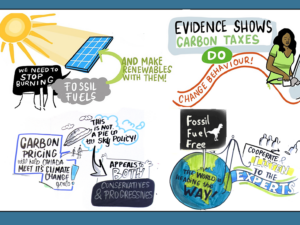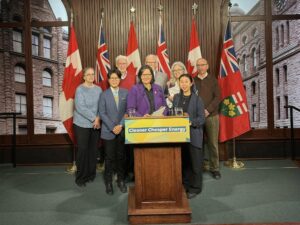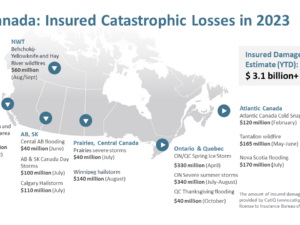
Citizens’ Climate Lobby members at COP 28 in Dubai: Kohei Noda (Japan), Aya Usai (Japan), Cathy Orlando (Canada), Sanjiv Mathur (Canada) And Cara Yu (Canada) In Dubai, United Arab Emirates (UAE), civil society gathered at the 28th Conference of the Parties for the United Nations Framework Convention on Climate Change (COP 28) during the hottest year on record and while bracing for an even hotter year ahead due to the impact of El Niño intensified by global heating gasses and sulfur termination shock. Present at COP 28 were three members of Citizens’ Climate Lobby Canada; our national director Cathy Orlando, her husband, Dr. Sanjiv Mathur and youth delegate Cara Yu. A discomforting fact from COP 28 was that the governments’ current 2030 targets will lead to 2.5°C of warming by the end of the century: 0.1°C higher than last year. But have hope because countries finally recognized that fossil fuels are the root cause of global warming and significant tracks were laid down for a liveable world. Most significantly, COP 28 yielded the first-ever global recognition that fossil fuels must be relegated to history. Additionally, because the “need to transition away from fossil fuels” was mentioned in a COP document, countries are now required to report on the transition from fossil fuels in their national climate targets. As well, there was confirmation that the transition needs to occur in the context of a 1.5C, which was a hard fought win by the vulnerable countries. There were many significant pledges, commitments, alliances and declarations made at COP 28: Joint Statement on Nature, Land Use, and Oceans; International Coalition to Phase Out Fossil Fuel Subsidies; Declaration on Climate and Health; Climate Relief Recovery and Peace; Declaration on Gender Balance and Just Transitions; The Global Cooling Pledge; Joint Task Force on International Taxation; Global Renewables and Energy Efficiency Pledge; The Fossil Fuel Non-Proliferation Treaty; The Beyond Oil and Gas Alliance; and Carbon Pricing developments. To see a fuller description and list of many declarations and commitments at COP go here: https://canada.citizensclimatelobby.org/wp-content/uploads/2023/12/cop-28-media-packet.pdf The fact is COPs do not occur in a vacuum. The Intergovernmental Panel on Climate Change (IPCC) is the leading international body for assessment of climate change. The IPCC provides governments at all levels with scientific information they can use to develop climate policies. The March 2023 IPCC Synthesis Report of the Sixth Cycle of IPCC AR6) was clear: there is sufficient global capital to transition our economy if barriers are reduced. Those barriers are plain for everyone to see. Whether it be for fossil fuels, forestry, farming or any environmentally intensive sector, we can and we must redirect financial flows towards a thriving and equitable future. But how can governments redirect financial flows? Whether it’s fossil fuels, farming, or forestry, all subsidies detrimental to our planet must be phased out, and polluters must be held accountable. Major banks, like the Royal Bank of Canada, the largest funder of fossil fuels globally, must align finances with the Paris Agreement. To that end Canadians should be paying close attention to the goings-on of the Senate Banking Committee and the Climate Aligned Finance Act. Globally, we need to continue pushing for reform at the World Bank and all the multilateral development banks. To fund all climate-related programs domestically and internationally, significant tax reform is essential. In Canada, Taxes and the Path to a Green Economy from the Canadians for Tax Fairness is an excellent resource. Globally, the go-to resource is the Joint Task Force on International Taxation. These structural changes will redirect finances and mitigate greenhouse gas emissions. With regards to subsidies, globally, governments spend at least $1.8 trillion a year, equivalent to 2% of global GDP, on subsidies that are driving the destruction of ecosystems and species extinction. Globally, subsidies included $640 billion to fossil fuels, $520 billion in agriculture, and $155 billion forestry. With subsidy reforms, gains in GDP and public sector finances would go a long way to financing a resilient future for all. There is an urgent need for significantly higher fossil fuel pollution prices. This approach ensures that those contributing to pollution bear the cost, ultimately rewarding consumers transitioning their habits for the collective good. This is economics 101 and Canada is leading a Global Carbon Pricing Challenge – which includes the European Union. Canada has shown the world how to price pollution and tackle affordability issues at the same time with our carbon pricing with rebates program. Interestingly, during COP 28, our director met up with an oil lobbyist. He shared with her his concern about the fallacy-ridden “technology not taxes” mantra in Canada. The crux? Fossil fuel pollution needs a $175 CAD price for carbon capture sequestration’s economic feasibility. Presently at $65 per tonne with rebates benefiting citizens, threats loom to dismantle this system during elections. This oil lobbyist urged for better education on carbon pricing rebates, advocating physical cheque distributions, applicable across Canada, save British Columbia and Quebec and the territories who all have adopted their own carbon pricing systems. “At COP 26 in Glasgow an economist’s words gave me hope: the transformation of the economy will not be linear. Reflecting on my experiences at COP 28 in Dubai, I am convinced of the validity of this statement,” said Cathy Orlando, National Director of Citizens’ Climate Lobby Canada. ####COP 28: Why the transformation of the economy will not be linear
FOR IMMEDIATE RELEASE: Thursday, December 28, 2023
MEDIA CONTACT: Cathy Orlando cathy@citizensclimate.org 705-929-4043
Stark statistics were presented in a food finance seminar at COP 28: almost one third of greenhouse gas emissions originate from the food sector, a figure inclusive of fossil fuel contributions. This leads to significant externalities, estimated to cost the global economy 10% of its GDP annually. To unravel the pollution conundrum, the panelists clearly were using lessons learned from the energy sector on how to transform the global agriculture sector.






